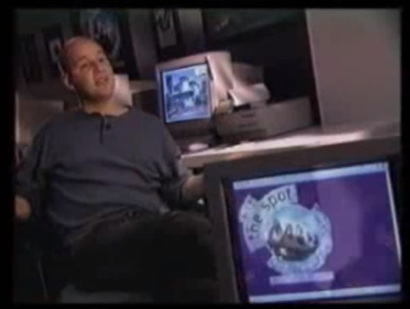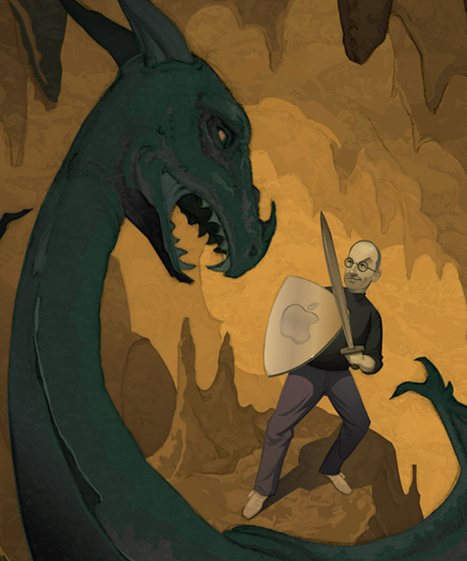 Your new post is loading...
 Your new post is loading...
Using storytelling to sell a product, brand or service isn’t in any way a new concept. The developing technology around us however, has given us new ways in which to engage and interact with our audience. Content marketing has become increasingly important as brands realize that in order to speak to their customers they need to invest in content that matters. The more brands have begun to focus on quality content, the more it becomes clear that storytelling is a key component to the content marketing process.
You wouldn’t (willingly) sit through a terrible film, or keep reading a book that you thought had a terrible plot, so why should people read your content if it doesn’t have a good story behind it?...
Why are you wasting everyone's time telling your company's story?...
This "look at us! we're so smart!" style of marketing has become woefully common in the post-Facebook era. People--particularly young people, I note--seem convinced that business communication consists of telling people about YOU.But in business, it's never about you. It's always about the customer....
Your competition can copy everything you do except for the story you tell.
Stop slugging it out with your competitors for a trickle of long-tail traffic. Content Marketing Institute’s Chief Strategist Robert Rose explains how you can crawl out of the trenches and get noticed by shifting your focus from search engines to storytelling.
Your competition is optimizing for the same keywords you are. More likely than not, they even follow the same recipe that you do: research keywords for the different stages of the funnel, spin up a post for each, and wait for Google to deliver new prospects. Even if you tweak your optimization to get ahead, a competitor will notice, copy it, and leave you back at square one.
Instead of relying so heavily on search engines to deliver customers, make your content the lead generator by telling a compelling story that engages readers, gets shared, and produces conversions. Robert Rose, Chief Strategist at The Content Marketing Institute, sat down with OpenView Labs to discuss why storytelling is such an important differentiator in today’s content-saturated marketing landscape and how you can get started....
I conducted a storytelling workshop last week.
Yes, the objective for the session was to help this corporate PR team apply the concepts of storytelling in business communications.
But I’m hoping for something bigger.
I’m hoping for two interrelated actions: - They question the status quo.
- They experiment in their day-to-day jobs....
Not that long ago we started distinguishing between owned, earned and paid media but how real was that? Media evolutions that scare me.... If you’re looking for tips and tricks regarding the evolutions in brand journalism and the usage of content marketing (oops, I used the term) in branding and PR, don’t read this. If you want an opinion (mine, that is) on the dangers of some content and media evolutions, read on. I have a good friend who’s quite cynical, even more than I am. He sees marketing as lying and making people pay too much for products. I can’t even blame him. As a former journalist and publisher but at the same time a marketer, I’m in a constant state of duality regarding the role of both journalism/media on one hand and marketing on the other. And in this “digital and social age” it’s getting worse. If you know part of the role of a publisher (read on) you’ll understand that duality. Also look at the number of journalists becoming “content marketers”. Are there still journalists in fact? I never read a story about a “content marketer” becoming a journalist. Especially phenomena such as brand journalism (for later blog posts) and converged media confuse me in an ‘ethical’ way. Marketing is business. Brands are business. Media is business. Brand journalism is business. If media converge, do we still have credible media? Each time I preach people-centric and human marketing, I hope you keep that in mind. We are not doing business for a greater moral cause (although we can, more than ever)....
...So the question is: Why is a story so important to your personal branding strategy? First of all, it sets your brand apart as unique. Every brand has its own story to tell, but yours is the only one of its kind. What drives you? Why did you enter the field that you find yourself in today? You’d be surprised at what details will intrigue the reader and give your audience an idea of what your brand is really about. Perhaps one of the most effective characteristics of a story is that it humanizes your brand. It’s easy to launch a brand, but the story behind it can leave your target audience wondering where it came from. What is your actual purpose? What drives your actions? Was it the right opportunity at the right moment? Now consider how your brand has affected others. How have you impacted the lives of those involved with your brand? Has it always gone smoothly? Are you new at this? What’s your experience prior to the creation of your brand? What is the story behind your personal brand? While the story for your brand might satisfy your present audience, the aspects of your personal brand story can turn you from just a brand into the personification they can truly relate to....
The Art Of Storytelling In Business Communications And Public Relations... ...Consider this line: The problem for many companies is that the very things that make push marketing effective—tight, relatively centralized operational control over a well-defined set of channels and touch points—hold it back in the era of engagement....
|
We talk a lot about the importance of storytelling when it comes to your small business or nonprofit blog or website, and even how you use social media. We’ve moved away from merely spitting out messages, particularly hard sales or marketing messages, and are now emphasizing the need to tell your story.
Your story as a brand, your story as an owner or manager, and the stories of your employees, customers, and clients. Telling your story isn’t just a matter of having something to talk about. There are actually a number of reasons why it makes good sense, and why you should take the time to rethink your online strategy, and begin telling your story...
I think advertisers are smart to want to have their ad copy look, read, and sound more like journalism. It’s a form of flattery for what we do, and although trust has waned in our profession recently—the public sees that our journalism is not as good as it used to be–it means that at least that the Mad Men of Madison Avenue think we’re more trustworthy than they are.
There’s an informative website, brandjournalists.com, that explains what these new kinds of ad producers do and why. It’s instructive.At base what they say they are doing is story telling. And, as they say, a good story is the essence of human communication. We journalists know that, or at least we should. If you can tell a good story about a company or organization, that’s likely to sell more product than the best old-hat sales pitch, the brand journalists reason.
They’re right. I agree with the ad folks that most companies have a good story to tell. I used to cover business and I never found a business I couldn’t find something interesting and newsworthy to write about.But let me show you how journalism is different than “brand journalism” or other kinds of sponsored content. This story you might even know....
Discover how your company can easily integrate characters and stories consumers want to share into your content, as well as examples of brands getting it right. The best marketing transcends corporate messaging, and becomes stories about people and characters which beg to be shared.
Aflac’s duck has been telling their company’s story for around 13 years now, and has increased their company’s recognition from 13% to 90% of consumers along the way. While content and social media best practices may change, few marketing tactics have more staying power than brand storytelling.
Storytelling isn’t just for brands who can claim over a century of history, like General Electric, or IBM. It’s for any company with the savvy to create a consistent customer experience online. As Debbie Williams of SPROUT Content puts it, your story is made up of “all that you are, and all that you do.” Brand storytelling isn’t about creating the perfect hero on your first try, it’s about finding ways to integrate your company’s history, goals, values, and audience into every component of your content marketing strategy....
Think of web television as a nuclear family. It all started with TV — the traditional type. Along came the web, which, in many ways, was TV’s polar opposite: interactive, responsive, progressive. As much as TV was about tradition, the web was all about change. From this unlikely pairing came little programs that, when viewed together, make up an episodic web series, or webisode. Webisodes share some of the attributes of each of their media parents; yet they also bring a whole new generation of brand storytelling opportunities to life. It’s this pedigreed combination of the web and television that some big brands are experimenting with as a way to provide distinctive and uniquely engaging content to consumers. As one of the most engaging forms of branded content, the episodic web series has a lot of appeal. For example, just like a TV miniseries or a series of books, a good web TV series can help forge an ongoing relationship with target consumers: Once viewers have been drawn in by the entertainment value of a webisode, they’re likely to stick around to see what happens next — and to visit related YouTube channels, Facebook pages, or other touch points that are part of your branded environment. They’ll get to know your brand a little better. They may even start to like it more than they realized....
Is relocating your nascent company to a startup hotbed worth the price of admission A Renobased entrepreneur weighs the pros and cons.... ... Creating a startup is hard enough without the additional expense and stress of moving, of not having friends and family around, and of not knowing where the best restaurants are. So I decided I had to make my new venture work in the place where I was already established. My point is that while there are benefits to planting yourself in a hub, there are plenty of advantages to setting up shop in a more isolated place. For starters, when I started ShortStack three years ago, I already knew where the best brew pub in Reno, Nevada was--so I haven’t wasted any time or money on bad beer! Here’s how to start a business wherever you are...
Customers own the story of the brand now. What brands say is far less important than what brands actually do to serve the well being of the faithful. Whereas before, the brand conversation was based on delivery and interruption, successful brand conversations are now participatory in ever more technology driven channels. Storytelling is at the very heart of how we humans share and connect what we value about our heritage, our communities and ourselves. Brand storytelling is about connecting the outer value the brand provides to the inner values of the customer. There must be a deep affinity between the two or the relationship is just a transaction. The foundation for this affinity is built on the shared stories between brands to consumers, customers to brands, and consumers to consumers. Like all relationships, there has to be chemistry. Brands have it or they don’t. How well these collective stories line up with the experience customers have is what creates “insistence without substitutes” in the minds of customers....
Via massimo facchinetti, Jesse Soininen
Steve Jobs resurrected Apple by slaying five dragons. See how he did it. A really inspiring article and great way to celebrate a technology marketing genius and innovator...
|



 Your new post is loading...
Your new post is loading...

























The more brands focus on quality content, the more storytelling is can make a difference to the success of your content marketing programs.